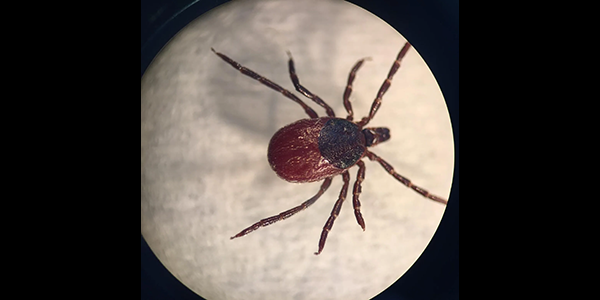||| FROM RUSSEL BARSH for KWIAHT |||
Native Blacklegged Ticks are questing again; in fact, they began their search for fresh hosts in the islands nearly a month earlier this year, presumably due to this winter’s unseasonably mild weather.
The islands’ conservation biology laboratory, Kwiaht, is calling on islanders to be more tick-aware–and to mail any ticks they find to Kwiaht at PO Box 415, Lopez Island 98261, for study. Place the tick in a plastic bag, sealed tightly with a note on the date, who or what pet was bitten, and how Kwiaht researchers can contact you with test results and other information. You don’t need to kill the tick, and you don’t need to refrigerate or freeze it before mailing.
Ticks appear to be disproportionately abundant on Orcas compared with other islands. You are most likely to encounter ticks while hiking in relatively wild, shrubby areas; for example, along trails on public lands. But nearly a third of the hundreds of ticks reported in the islands since 2021 were noticed after walking in a residential area amongst homes and gardens. In the San Juan Islands, tick encounters peak in March. Very few ticks are seen on people or pets in summer.
It is especially important that you inspect your dog often, because many tick-borne pathogens can cause symptoms in both dogs and humans. Dogs help host and disperse in the islands, moreover. They are about four times as likely to pick up questing ticks from the environment as their human companions.
About 10 percent of the ticks shared with Kwiaht thus far have tested positive for a pathogen that may be infectious. What we see most often are previously unstudied local strains of the microparasite Babesia, a protozoan that can infect red blood cells. In the eastern United States, Babesia frequently causes Lyme-like symptoms; indeed, it was responsible for numerous cases where patients were certain they had Lyme disease but tested negative for the Lyme spirochete microparasite, Borrelia.
None of the Babesias we have found in San Juan County are identical to known infectious strains, but this does not mean they are harmless. Kwiaht has partnered with the population genetics group at the Fred Hutchinson Cancer Center in Seattle to sequence DNA from Babesias from the islands and investigate how they have mutated and evolved as they spread westward across the continent. We are also sharing tick specimens and data with the state Department of Health and the Centers for Disease Control.
If you find a tick attached to yourself, a member of your family, or a pet, use tweezers to quickly and firmly pull it out with as much of the head as possible. Treat the bite as a wound. Wash it with soap and water, an alcohol-based disinfectant or rubbing alcohol if you have it handy. Consult your doctor or veterinarian, especially if a rash or flu-like symptoms develop, and ask them to contact info@kwiaht.org.
**If you are reading theOrcasonian for free, thank your fellow islanders. If you would like to support theOrcasonian CLICK HERE to set your modestly-priced, voluntary subscription. Otherwise, no worries; we’re happy to share with you.**







